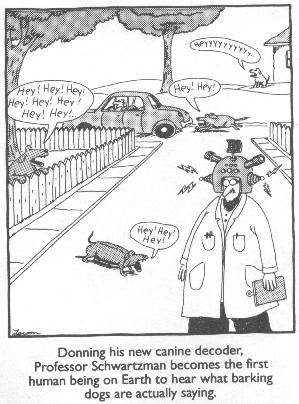Can Old Dogs Learn New Tricks? The Far Side and the Humor of Adapting

Have you ever tried teaching an old dog a new trick? It's a common expression, often met with a chuckle and a knowing nod. But what makes this concept so universally relatable? Gary Larson's The Far Side cartoons frequently tapped into this theme, presenting absurd and hilarious scenarios of animals, particularly dogs, grappling with the unfamiliar. This exploration of the "old dog, new trick" dynamic made The Far Side a cultural touchstone, resonating with audiences who saw themselves in these unlikely protagonists.
The Far Side wasn't just about bizarre cows or talking dogs. It was a reflection of our own struggles with change, presented through a darkly comedic lens. Whether it was a dog trying to operate a computer or a cow attempting to fly, Larson's comics captured the inherent awkwardness and humor of stepping outside our comfort zones. This article delves into the enduring appeal of The Far Side, specifically its focus on the "old dog, new trick" trope, and why it continues to make us laugh decades later.
The "old dog, new trick" concept is deeply rooted in our collective understanding of habit and adaptation. We often associate older age with established routines and resistance to change. This isn't limited to age, however. We all experience moments where we're confronted with something new and challenging, leaving us feeling like the proverbial old dog facing a bewildering new trick. The Far Side brilliantly satirizes this experience, exaggerating our anxieties and insecurities for comedic effect.
Gary Larson's The Far Side debuted in 1980 and quickly gained a devoted following. Its single-panel format, combined with Larson's surreal and often macabre humor, set it apart from other comic strips. The Far Side wasn't about punchlines; it was about creating a moment of unexpected absurdity. A dog driving a car, a cow participating in a séance, these scenarios weren't just funny; they were thought-provoking, prompting us to consider the nature of reality and our place within it. The recurring theme of animals attempting new, often human-like activities, fueled the "old dog, new trick" narrative that resonated so strongly with readers.
The success of The Far Side can be attributed to several factors. Larson's unique artistic style, coupled with his uncanny ability to find humor in the mundane, created a world that was both familiar and utterly bizarre. The single-panel format allowed for a quick, impactful dose of humor, perfect for newspaper readers looking for a brief escape. But perhaps the most significant factor was Larson's ability to tap into universal human experiences, like the struggle to adapt to change. The "old dog, new trick" theme became a hallmark of The Far Side, representing the awkwardness, frustration, and occasional triumph of learning and growing.
The Far Side offers numerous examples of animals, specifically dogs, attempting new skills with varying degrees of success. One iconic example is a dog attempting to use a computer, paws hovering awkwardly over the keyboard. Another depicts a dog trying to learn to ride a bicycle, resulting in predictable chaos. These simple yet effective images encapsulate the humor and frustration of learning something new, regardless of age or species.
Learning something new, even if challenging, offers numerous benefits: Increased mental agility, expanded skillset, and boost in confidence. The Far Side, while humorous, indirectly highlights these advantages. Even in the midst of the comedic struggle, there's a sense of growth and potential.
The humor of The Far Side lies in its exaggeration and absurdity. While we may not be teaching our dogs to drive, we can relate to the feeling of being out of our depth, facing a new challenge that seems insurmountable. The Far Side allows us to laugh at ourselves, acknowledging the universality of this experience.
The "old dog, new trick" theme resonates because it's a fundamental part of the human experience. We are constantly learning, adapting, and evolving. The Far Side's humorous take on this process reminds us that it's okay to struggle, to feel awkward, and to embrace the absurdity of life.
Acura integra type s green unleashing the emerald beast
Navigating legal waters with the w james payne law firm
Boat steering pulling right troubleshooting your vessels drift













